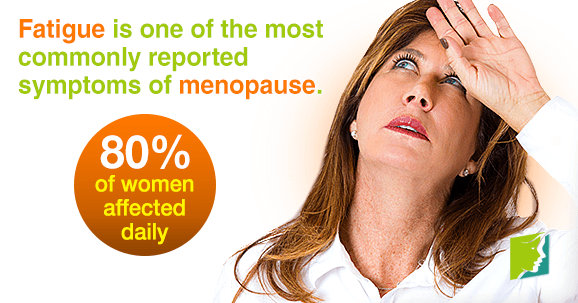Fatigue is one of the most commonly reported symptoms of menopause, affecting as many as 80% of women daily. The experience is described as the ongoing feeling of weakness, tiredness, and decreased energy levels, rather than just the desire to sleep. Other characteristics include apathy, decreased attention span, and irritability. Fatigue in menopausal women is commonly caused by hormonal fluctuations, specifically, drops in estrogen levels.
It is important to understand that fatigue alone is not a sign of menopause. Women of all ages experience fatigue for a variety of reasons. When fatigue is accompanied by symptoms like mood swings, vaginal dryness, hot flashes, and night sweats, it is likely that you are transitioning into menopause.
Causes of Fatigue
Hormonal fluctuations -specifically, the flux of estrogen and progesterone - are the primary cause of fatigue during menopause. Estrogen regulates waking and sleeping, helping to maintain the body's schedule. Progesterone affects the part of the brain that releases the sensation of sleepiness. Thus, when these hormone levels decrease, women tend to have more difficulty sleeping.
In addition to hormonal causes of fatigue, lifestyle habits can also be responsible. These include things like stress, overwork, poor diet, and insufficient exercise or sleep. It is important to maintain a healthy lifestyle no matter what your age. When approaching menopause however, it becomes especially crucial to maintain a balanced lifestyle in order to reduce severity of fatigue and other troublesome menopausal symptoms.
Treatments
Since hormonal imbalance is the primary cause of fatigue, restoring the balance is vital. This can be achieved through several methods, herbal supplements being just one. Herbal supplements are a low risk and cost-effective way of maintaining balance within the body. Black cohosh (Actaea racemosa) is commonly recommended for hormonal imbalance as it contains plant compounds called phytoestrogens, which resemble estrogen and mimic its function.
Another herbal option to consider is hormone-regulating supplements that do not contain phytoestrogens or any other hormones. Instead, they work by providing the endocrine system with ample nutrients that promote the body's natural hormone production. Making simple lifestyle changes like getting proper exercise every day, eating healthy meals, and getting plenty of sleep, are also key to fighting fatigue.
Daily fatigue is a symptom of menopause, but it is important not to jump to conclusions if it is the only symptom you are experiencing. Menopause is characterized by many different symptoms like hot flashes, mood swings, irregular periods, and loss of libido, and fatigue is just one of them. However, if fatigue is accompanied by other symptoms, like vaginal dryness and hair loss, then it is more likely that you are transitioning into menopause.
Sources
- National Health Service UK. (2013). Self-help tips to fight fatigue. Retrieved July 18, 2014, http://www.nhs.uk/Livewell/tiredness-and-fatigue/Pages/self-help-energy-tips.aspx
- National Health Service UK. (2013). Why am I tired all the time? Retrieved July 18, 2014, http://www.nlm.nih.gov/medlineplus/fatigue.html
- National Institutes of Health. (2014). Fatigue: Medline Plus. Retrieved July 18, 2014, http://www.nlm.nih.gov/medlineplus/fatigue.html
- Scwartz, M.D. & Mong, J.A. (2013). Estradiol modulates recovery of REM sleep in a time-of-day-dependent manner. American journal of physiology, 305(3), R271-80. doi: 10.1152/ajpregu.00474.2012




